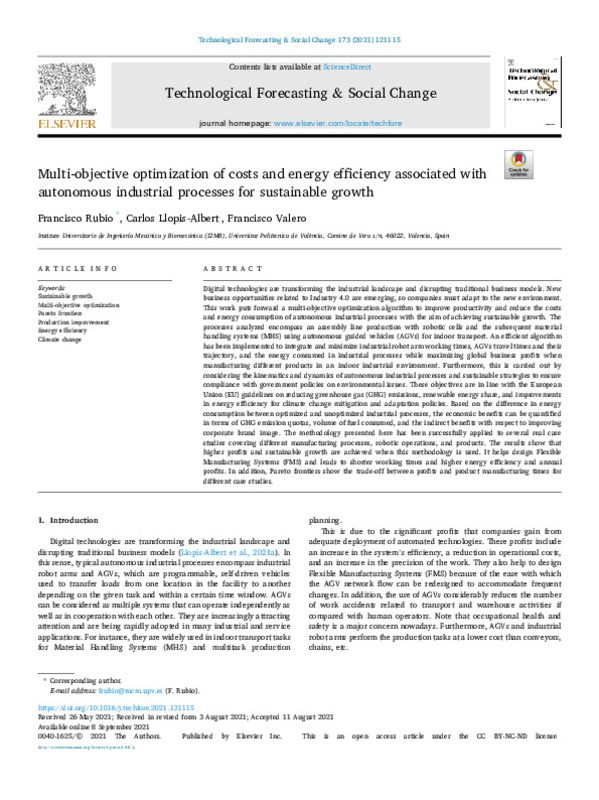JavaScript is disabled for your browser. Some features of this site may not work without it.
Buscar en RiuNet
Listar
Mi cuenta
Estadísticas
Ayuda RiuNet
Admin. UPV
Multi-objective optimization of costs and energy efficiency associated with autonomous industrial processes for sustainable growth
Mostrar el registro sencillo del ítem
Ficheros en el ítem
| dc.contributor.author | Rubio Montoya, Francisco José
|
es_ES |
| dc.contributor.author | Llopis-Albert, Carlos
|
es_ES |
| dc.contributor.author | Valero Chuliá, Francisco José
|
es_ES |
| dc.date.accessioned | 2022-07-25T18:06:28Z | |
| dc.date.available | 2022-07-25T18:06:28Z | |
| dc.date.issued | 2021-12 | es_ES |
| dc.identifier.issn | 0040-1625 | es_ES |
| dc.identifier.uri | http://hdl.handle.net/10251/184748 | |
| dc.description.abstract | [EN] Digital technologies are transforming the industrial landscape and disrupting traditional business models. New business opportunities related to Industry 4.0 are emerging, so companies must adapt to the new environment. This work puts forward a multi-objective optimization algorithm to improve productivity and reduce the costs and energy consumption of autonomous industrial processes with the aim of achieving sustainable growth. The processes analyzed encompass an assembly line production with robotic cells and the subsequent material handling systems (MHS) using autonomous guided vehicles (AGVs) for indoor transport. An efficient algorithm has been implemented to integrate and minimize industrial robot arm working times, AGVs travel times and their trajectory, and the energy consumed in industrial processes while maximizing global business profits when manufacturing different products in an indoor industrial environment. Furthermore, this is carried out by considering the kinematics and dynamics of autonomous industrial processes and sustainable strategies to ensure compliance with government policies on environmental issues. These objectives are in line with the European Union (EU) guidelines on reducing greenhouse gas (GHG) emissions, renewable energy share, and improvements in energy efficiency for climate change mitigation and adaptation policies. Based on the difference in energy consumption between optimized and unoptimized industrial processes, the economic benefits can be quantified in terms of GHG emission quotas, volume of fuel consumed, and the indirect benefits with respect to improving corporate brand image. The methodology presented here has been successfully applied to several real case studies covering different manufacturing processes, robotic operations, and products. The results show that higher profits and sustainable growth are achieved when this methodology is used. It helps design Flexible Manufacturing Systems (FMS) and leads to shorter working times and higher energy efficiency and annual profits. In addition, Pareto frontiers show the trade-off between profits and product manufacturing times for different case studies. | es_ES |
| dc.language | Inglés | es_ES |
| dc.publisher | Elsevier | es_ES |
| dc.relation.ispartof | Technological Forecasting and Social Change | es_ES |
| dc.rights | Reconocimiento - No comercial - Sin obra derivada (by-nc-nd) | es_ES |
| dc.subject | Sustainable growth | es_ES |
| dc.subject | Multi-objective optimization | es_ES |
| dc.subject | Pareto frontiers | es_ES |
| dc.subject | Production improvement | es_ES |
| dc.subject | Energy efficiency | es_ES |
| dc.subject | Climate change | es_ES |
| dc.subject.classification | INGENIERIA MECANICA | es_ES |
| dc.title | Multi-objective optimization of costs and energy efficiency associated with autonomous industrial processes for sustainable growth | es_ES |
| dc.type | Artículo | es_ES |
| dc.identifier.doi | 10.1016/j.techfore.2021.121115 | es_ES |
| dc.rights.accessRights | Abierto | es_ES |
| dc.contributor.affiliation | Universitat Politècnica de València. Departamento de Ingeniería Mecánica y de Materiales - Departament d'Enginyeria Mecànica i de Materials | es_ES |
| dc.description.bibliographicCitation | Rubio Montoya, FJ.; Llopis-Albert, C.; Valero Chuliá, FJ. (2021). Multi-objective optimization of costs and energy efficiency associated with autonomous industrial processes for sustainable growth. Technological Forecasting and Social Change. 173:1-8. https://doi.org/10.1016/j.techfore.2021.121115 | es_ES |
| dc.description.accrualMethod | S | es_ES |
| dc.relation.publisherversion | https://doi.org/10.1016/j.techfore.2021.121115 | es_ES |
| dc.description.upvformatpinicio | 1 | es_ES |
| dc.description.upvformatpfin | 8 | es_ES |
| dc.type.version | info:eu-repo/semantics/publishedVersion | es_ES |
| dc.description.volume | 173 | es_ES |
| dc.relation.pasarela | S\445707 | es_ES |








